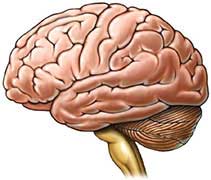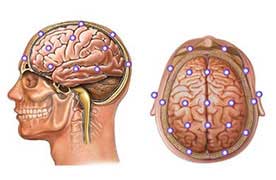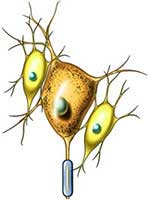
Epilepsy is a chronic condition that causes seizures when temporary changes occur in the electrical function of the brain. These changes also affect awareness, movement, and sensation. Seizures occur when clusters of nerve cells in the brain, called neurons, communicate with each other abnormally.
During a seizure, the neurons' normal pattern of activity is disturbed. This causes them to fire as many as 500 times per second, instead of the normal rate of about 80 times per second. This results in strange sensations, emotions, behavior, convulsions, muscle spasms, and/or loss of consciousness.
Causes of Epilepsy
In many cases, the exact cause of epilepsy is not known. There are many causes of abnormal brain wiring and imbalanced neurotransmitters that can cause seizures, including:
Neurons in Nerve Tissue

Copyright® Nucleus Medical Media, Inc.
- Head injury
- Stroke
- Brain abnormalities inherited at birth
- Brain injury like hypoxia (lack of oxygen) at birth
- Brain tumors
- Alcohol use disorder
- Metabolic conditions like low blood sugar, very high blood sugar, low calcium, high or low sodium, or low magnesium
- Alzheimer's disease
- Heart failure
- Liver or kidney failure
- Sickle cell anemia
- Vasculitis
- Any condition that deprives the brain of oxygen, such as near drowning
- Infectious diseases like:
- Meningitis
- AIDS
- Viral encephalitis
- Malaria
- Tetanus
- Brain abscess
- Syphilis
- Hydrocephalus—excess fluid in the brain
- Celiac disease—intolerance to wheat gluten
- Exposure to:
- Lead
- Carbon monoxide
- Other environmental toxins
- Chemical warfare agents
- Certain illegal drugs, like cocaine and amphetamines
- Overdose of antidepressants and other medicines
- Withdrawal from alcohol, sedatives, and hypnotics
- Certain medications increase the risk of seizures, including:
- Tricyclics
- Theophylline
- Penicillin
- Phenothiazine
In children, seizures may occur with:
- High fever
- Maternal infections
- Poor nutrition
- Vitamin B6 deficiency in neonates, infants
- Lead poisoning
- Hereditary, including genetic syndromes and metabolic disorders
Risk Factors for Epilepsy
A risk factor is something that increases your likelihood of getting a disease or condition. It is possible to develop epilepsy with or without the risk factors listed below. The more risk factors you have, the greater your likelihood of developing epilepsy. Risk factors for epilepsy include:
- Brain Injury—either from external (environmental) or internal (medical/metabolic) sources
Side View of the Brain

Copyright® Nucleus Medical Media, Inc.
- Genetic abnormalities inherited at birth
- Age—In children, risk factors include:
- High fever
- Poor nutrition
- Exposure to toxins, such as:
- Lead
- Carbon monoxide
- Other environmental toxins
- Certain illegal drugs
- Overdose or withdrawal of antidepressants and other medications
- Medication interactions
- Alcohol use disorder
- Cysticercosis—an infection caused by a pork tapeworm
Symptoms of Epilepsy
Epileptic seizures differ in their severity and cause a wide range of symptoms. Some seizures are mild and last only 1 or 2 minutes. Other seizures cause intense symptoms that last much longer. Acute, repetitive seizures may result in damage to the heart or brain, and possibly death if emergency treatment is not given right away. There are many different ways of classifying seizures, including:
Partial or Focal Seizures
These seizures begin from just 1 part of the brain. Symptoms include:
- Tingling or numb sensations in the arms, legs, hands, or feet
- Muscle twitching on 1 side of a limb, hand, finger, or muscle
- Experiencing smells, tastes, sights, sounds, or other sensations that are not real
- Unusual, repetitive, uncontrolled motions, such as chewing or smacking the lips
The term Jacksonian refers to a partial seizure where symptoms spread from 1 part of the body to another. Focal onset seizures can become generalized, meaning they spread to both sides of the brain.
Generalized Convulsive (Grand Mal) Seizures
These seizures begin from both sides of the brain. Symptoms include:
- Unconsciousness
- Loss of urinary or bowel control
- Muscle spasms or stiffening of the muscles
- Drop attacks
- Unusual, repetitive, uncontrolled motions or movements
- Biting of tongue
- Prior to the convulsions:
- Feeling of unusual warning, such as the smell of burning rubber
- After convulsions:
- Deep sleep, drowsiness, confusion, or altered responsiveness
- Awakening with headache
- Awakening with no memory of the seizure
Generalized Non-Convulsive (Petit Mal) Seizures
Petit mal seizures are more common in children. Symptoms include:
- Appearance of daydreaming
- Blinking of the eyes rhythmically
- Twitching of facial muscles
- No memory of the seizure after it occurs
Diagnosing Epilepsy
A diagnosis of epilepsy usually is not made until a person has a seizure more than once without a preventable cause. Your doctor will take a detailed history to help determine if you have epilepsy, including questions about:
- Your past medical history
- Family medical history
- Any medications and supplements that you take
- Seizure patterns:
- How were you feeling before the seizure?
- How old were you at the onset of the condition?
- Was there any warning?
- What did the seizure look like, or what were you told it looked like?
- Were there any symptoms after the seizure?
- How long did the seizure last?
- How many seizures have you had before?
- After the seizure, did paralysis, twitches, confusion, slowed responsiveness, urine incontinence, or tongue biting occur?
Your doctor will perform a physical exam, giving special attention to your nervous system. Tests will be taken to see if you have epilepsy and, if so, what type of seizures you have. In addition, you may need other tests on your brain activity, blood, bodily fluids, and motor, behavioral, and intellectual capabilities.
1. Brain Activity Tests
- EEG—Best results are achieved within 24 hours of a seizure. Repetitive or continuous EEG monitoring may be needed.
- Magnetoencephalogram (MEG)
- You may need to have 1 or more types of brain scans, including:
- CT scan and MRI scan
- PET scans
- SPECT scan
- MR spectroscopy
- Angiography
- Echoencephalogram—This test is most often used in infants.
Placement of Sensors for an EEG

Copyright® Nucleus Medical Media, Inc.
2. Blood Tests
- Metabolic disorders like abnormal levels of sugar, calcium, sodium, potassium, or magnesium
- Genetic disorders
- Infections, such as encephalitis, meningitis, or HIV
- Lead poisoning
3. Bodily Fluid Tests
- Urine tests
- Lumbar puncture evaluates cerebrospinal fluid in the brain and spinal cord
4. Tests on Motor Abilities, Behavior, and Intellectual Capacity
- Developmental
- Neurological
- Behavioral
Treating Epilepsy
The goal of treatment is to prevent or control epileptic seizures. Treatment is fully or partially successful in about 80% of patients. Medication is generally the most successful way to treat and manage epilepsy. Lifestyle changes and other treatments, like a ketogenic diet, also may be recommended and sometimes surgery is recommended.
Neurons

Copyright® Nucleus Medical Media, Inc.
Preventing Epilepsy
Taking preventive measures may prevent some cases of epileptic seizures. These measures include:
- Preventing head injuries by:
- Wearing seat belts and bicycle helmets
- Properly buckling children in car seats
- Treating a seizure properly by:
- Seeking medical help immediately after suffering a first seizure
- Taking medication after the first or second seizure
- Getting good prenatal care to help prevent brain damage to a developing fetus:
- Treatment for high blood pressure and any infections
- Maintaining proper nutrition, including adequate vitamin intake
- Avoiding excess alcohol intake, cigarettes, and illegal drugs
- Treating high fevers (especially in children) with medication
- Taking steps to prevent or control certain medical conditions, including:
- High blood pressure
- Heart disease
- Liver disease
- Kidney disease
- Infections
- Any disorder that may affect or injure your brain
$webqFacilityNumber
Need a Physician?